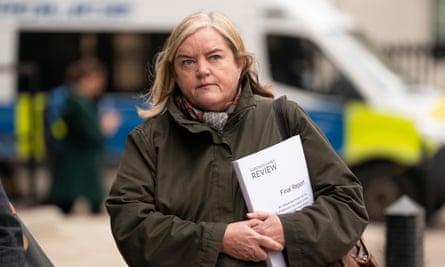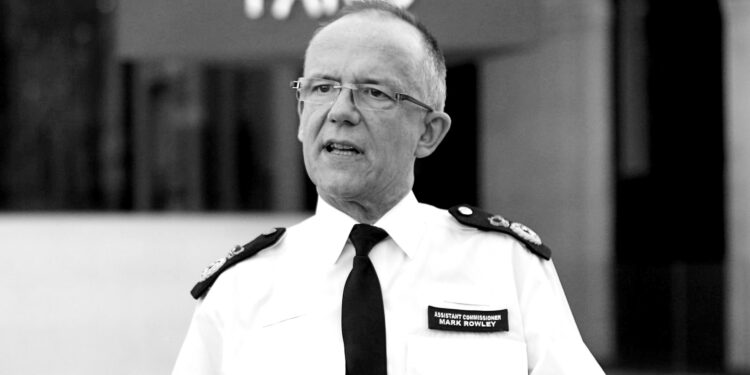Author of landmark report says Met can ‘no longer presume that it has the permission of the people of London to police them’
The Metropolitan police is broken and rotten, suffering collapsing public trust and is guilty of institutional racism, misogyny and homophobia, an official report has said.
The report by Louise Casey, commissioned by the Met after one of its officers abducted Sarah Everard, taking her from from a London street in March 2021, before raping and murdering her, is one of the most damning of a major British institution .
The 363-page report details disturbing stories of sexual assaults, usually covered up or downplayed, with 12% of women in the Met saying they had been harassed or attacked at work, and one-third experiencing sexism.
Lady Casey said that the lifeblood of British policing was haemorrhaging and her report warned that “public consent is broken” with just 50% of the public expressing confidence, even before revelations about the force’s worst recent scandals.
She pinned the primary blame on its past leadership and said: “Public respect has fallen to a low point. Londoners who do not have confidence in the Met outnumber those who do, and these measures have been lower amongst black Londoners for years.
“The Met has yet to free itself of institutional racism. Public consent is broken. The Met has become unanchored from the Peelian principle of policing by consent set out when it was established.”
The report found a bullying culture, frontline officers demoralised and feeling let down by their leaders, and discrimination “baked into the system”.
Casey revealed that one Muslim officer had bacon stuffed in his boots, a Sikh officer had his beard cut, minority ethnic officers were much more likely to be disciplined or leave, and Britain’s biggest force remains disproportionately white, in a capital that is increasingly diverse.

Stop and search and use of force on powers against black people was excessive, found the report for the Met – which stops more people per head of population than any other force.
A catalogue of suffering by women included frequent abuses by senior officers, including one subjecting a female junior to repeated harassment and an indecent act. She complained and told the inquiry: “It would have probably been better to suffer in silence, but I couldn’t do that. He got away with everything, I was made to look like the liar.”
Casey said the Met was failing on so many levels the crisis is existential, and if not fixed could end in its dismemberment: “If sufficient progress is not being made at the points of further review, more radical, structural options, such as dividing up the Met into national, specialist and London responsibilities, should be considered to ensure the service to Londoners is prioritised.”
Casey said austerity had deprived the Met of £700m but the cuts made by the force left its protection of children and women as inadequate.
Already crushingly low convictions of rapists were made worse by fridges that housed rape kits being broken, or being so full that evidence was lost, and cases dropped with rapists going free because of police bungles. Casey claimed in one instance someone ruined a fridge full of evidence by leaving their lunchbox in it.
Casey said the Met had blown repeated chances to reform by official inquiries over the decades and warned the force must not cherrypick the reforms it likes. It should implement her recommendations as a whole, she said.
But a gap and potential high level clash was emerging after Casey’s report was published, with those who oversee and run the Met having had the report for days.
Sir Mark Rowley, the force’s commissioner since September, said he would not use the labels of institutionally racist, institutionally misogynistic and institutionally homophobic that Casey insisted Britain’s biggest force deserved.
But one of the two people who hired him – and thus can fire him – made clear he agreed with Casey’s damning verdicts.
Sadiq Khan, the London mayor, has not previously used the term “institutional” about prejudice in the force he oversees since coming to office. He will be chairing a new oversight board for the Met, in effect placing it in a form of special measures for the foreseeable future.
Khan said: “The evidence is damning. Baroness Casey has found institutional racism, misogyny and homophobia, which I accept.
“I’ll be unflinching in my resolve to support and hold the new commissioner to account as he works to overhaul the force.”

Rowley said he wanted more time to study Casey’s recommendations, but said he accepts the findings. He said he accepted Casey’s factual findings about racism, misogyny and homophobia in his organisation and they were systemic, but neither he nor the Met would accept they were “institutional”, claiming it was a political term.
Rowley, battling to avoid being the last commissioner of the Met in its current shape and form, said: “I have to use practical, unambiguous, apolitical language … I don’t think it fits those criteria.
“It’s simply a term I’m not going to use myself.”
Asked if he was not accepting the finding, Rowley said: “I’m accepting we have racists, misogynists. I’m accepting, we’ve got systemic failings, management failings, cultural failings.
“This is about an organisation that needs to become determinedly anti-racist, anti-misogynist, anti-homophobic.
Source: The Guardian


Recent Comments